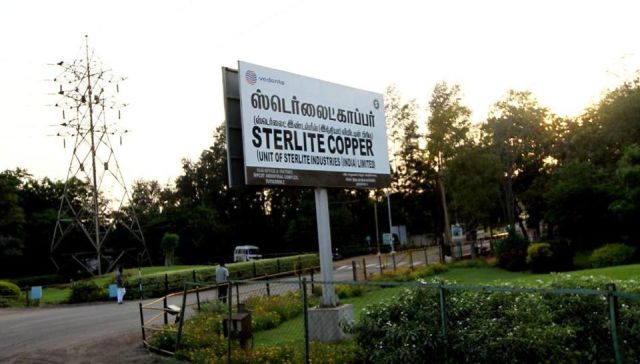
by Editor | May 25, 2021 | Corporate, Corporate Governance, Corporate Jobs, Employment, Private Jobs

Sterlite Copper
New Delhi : The decision of the Tamil Nadu government to shut the copper smelter plant in Tuticorin would have serious economic ramifications by pushing India’s annual import bill by an estimated $2 billion, said P. Ramnath, CEO, Sterlite Copper.
“The sudden decision of Tamil Nadu government to close down our copper smelter in Tuticorin will have far reaching ramifications for the economy of not only the town and its adjoining villages but also the country,” Ramnath said in a statement to IANS.
“While an estimated 30,000 direct and indirect jobs are now on the line, a large number of small to medium enterprises that are dependent on our smelter for copper are also likely to suffer due to supply disruptions. Since Vedanta Sterlite is one of the largest copper producers in the country, manufacturers in sectors ranging from electrical to defence will have to turn to imports and that will push up the nation’s annual import bill by an estimated $2 billion based on the current price,” he added.
In a second successive blow to Vedanta Ltd, the State Industries Promotion Corporation of Tamil Nadu Ltd (SIPCOT) on Tuesday cancelled in “larger public interest” the land allotted in Thoothukudi for the expansion of Sterlite Copper’s smelting plant.
The Vedanta copper smelter serves over 800 small and medium enterprises (SMEs) in the downstream industry for the critical electrical sector. The bulk of supplies to the electrical sector are to units in northern and western regions.
In its letter to Vedanta, the SIPCOT cited the public protests against the plant’s expansion on grounds of increased pollution and expressed concerns over pollution caused by the first smelter plant.
The government agency said the price of 342.22 acres deposited will be refunded as per the norms.
On Monday, the government issued orders to close Vedanta’s first copper smelter unit, whose capacity is 400,000 tonne per annum.
The Tuticorin facilities include a custom smelter, a refinery, a phosphoric acid plant, sulphuric acid plants and a copper rod plant. In addition, there is a captive power plants located in Tuticorin and a refinery and two copper rod plants operating in Silvassa, western India.
The closure order came after a total of 13 persons were killed in police firing on May 22 and the next day in protests in Thoothukudi against the continued functioning of the unit.
In November 2017, Vedanta said its board approved the expansion of its copper smelter to 800,000 TPA with a capex of $717 million, of which $141 million had already been spent.
The company claimed that after completion the project will make Thoothukudi as one of the world’s largest single-location copper smelting complexes.
—IANS
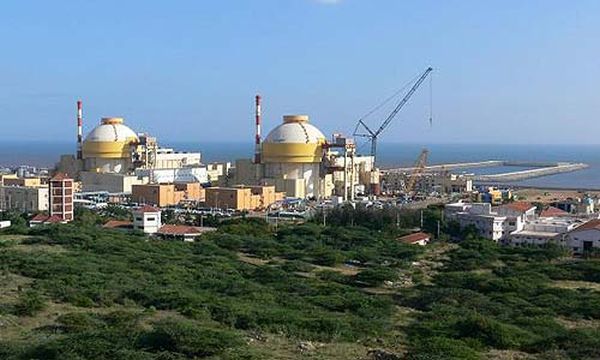
by Editor | May 25, 2021 | Corporate, Corporate Buzz, News

Kudankulam n-plant
By Biswajit Choudhury,
Rostov-on-Don (Russia) : The steam generator for the third unit of the Kudankulam Nuclear Power Project (KNPP) in Tamil Nadu is three months away from completion at the Atomenergomash factory around three hours drive from here, according to its Director, Maksim Jidkov.
Leading a party of Indian journalists on a tour of the facilities of this manufacturing arm of Russian state atomic energy corporation, Rosatom, Jidkov pointed to a generator vessel mounted high in the gigantic workshop measuring 300,000 sq mt. Rosatom are the equipment suppliers and technical consultants for the KNPP, the first two units of which have already been commissioned.
Being one of Russia’s biggest industrial complexes, Atomenergomash has 6 million sq mt of production facilities in this area of southwest Russia, in another part of which, at Sochi on the Black Sea, Prime Minister Narendra Modi met with Russian President Vladimir Putin on Monday without a prior agenda, “to further strengthen the special and privileged strategic partnership between India and Russia”, according to a PMO statement.
According to Indian officials currently in Russia, given that the unofficial agenda of the Modi-Putin meet in Sochi was to discuss the situation developing out of the US withdrawal from the Iran nuclear deal, Indo-Russian cooperation in nuclear energy was bound to have figured in the talks.
“The manufacture of the steam generator for KNPP-3 is at an advanced statge and only the last 3 months are remaining of a process that takes two years,” Jidkov said.
“The relationship with India is very important to us. The KNPP contsruction will improve our relations and we hope to have many more projects in India,” he added.
Atomenergomash Chief Executive Nikipelov Andrey said at Rosatom’s just-concluded 10th Atomexpo conference at Sochi that the transfer of technology for the third and fourth units of KNPP would start by the end of this year and the company hoped to finish the work by the end of 2019. He also hoped to sign the agreements for Kudankulam units 5 and 6 before the end of this year.
The KNPP’s 1,000 MW each units 3 and 4, being developed by the Nuclear Power Corporation of India (NPCIL), are expected to become operational by 2021.
Jidkov said that the company has a current order book of $60 billion and has set up units in various countries creating a nuclear capacity of 66,000 MW worldwide. Its equipment are currently in operation in 20 countries.
Atomenergomash has exported to Germany, France, China, India, Hungary, Bulgaria, Belarus, Turkey, Iran, Finland and the Czech Republic, among others.
Parent company Rosatom has many firsts to its credit like the first nuclear power plant at Oblelinsk (Russia) in 1954, the first experimental fast-neutron reactor in 1964 and the first nuclear plant in the Middle East in Bushehr (Iran) commissioned in 2011.
Besides nuclear equipment, Atomenergomash produces thermal power machinery, metallurgical, mining, oil and gas production and processing systems, including ready for use plants for deep processing of petroleum, equipment for the construction industry, for sea water desalination plants, containers for transportation and disposal of nuclear waste and biomass energy units, among others.
The firm manufactures the entire package of products for the nuclear island, including the reactor assembly, steam generator, the main circulation pump and the main circulating pipeline.
Some of the products manufactured by the company include refuelling equipment, both dry and wet spent fuel storages, depleted uranium and lead shieldings, condensers, cranes and lifting equipment, specialised doors, heat exchangers, pool water purification systems, pressure vessels, storage tanks, pumps, nuclear steam supply systems, reactor control rods, reactor internals and reactor pressure vessel seals.
The huge production hall opens on one side to the company’s own mooring berth on the Tsimlyansk Reservoir, which allows shipping bulky and heavy products. After being transported by barge over the reservoir, the shipments take the Volga-Don Canal on to the Baltic Sea port for their onward overseas journey.
Rostov, on the Don river, has for centuries been a major shipping lane connecting southwestern Russia with the north. With the construction of the Volga-Don Shipping Canal in 1952, Rostov-on-Don became a port of five seas – the Black Sea, the Sea of Azov, the Caspian Sea, the White Sea, and the Baltic Sea.
(Biswajit Choudhury was invited to visit Russia by Rosatom. He can be reached at biswajit.c@ians.in)
—IANS
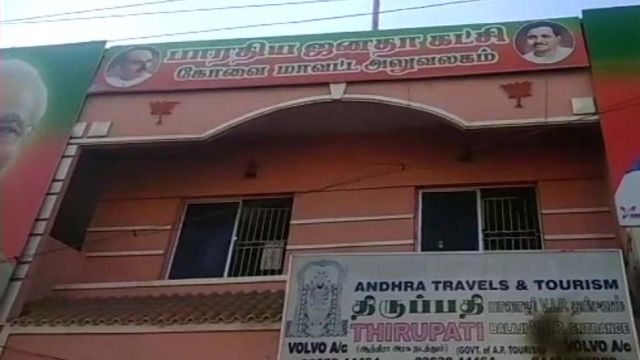
by Editor | May 25, 2021 | News, Politics
 Chennai : Hours after a BJP office in Tamil Nadu was attacked, party National Secretary H. Raja on Wednesday expressed regret for his Facebook post that said statues of rationalist movement founder E.V.Ramasamy or Periyar would be razed to the ground in the state.
Chennai : Hours after a BJP office in Tamil Nadu was attacked, party National Secretary H. Raja on Wednesday expressed regret for his Facebook post that said statues of rationalist movement founder E.V.Ramasamy or Periyar would be razed to the ground in the state.
Early on Wednesday a petrol bomb was hurled at a BJP office around 500 km from here in Coimbatore by unidentified persons.
Later in a fresh Facebook post on Wednesday, Raja expressed his heartfelt regret for his Tuesday’s post, which he claimed was a message posted by his social media administrator without his permission and hence he had removed it.
Raja expressed regret if his post had hurt anybody’s feelings. According to him, damaging the statues of Ramasamy is not agreeable.
The message that was posted and later removed said: “Who is Lenin? What is the connection between him (Lenin) and India? What connection between communism and India?
“Lenin’s statue was broken down in Tripura. Today it is Lenin’s statue in Tripura and tomorrow it will be the statue of caste fanatic E.V.Ramasamy.”
Late on Tuesday, two persons were arrested in Thirupattur in Vellore district for vandalising Ramasamy’s statue.
The attackers at the BJP’s office in Coimbatore had come in a three wheeler and had thrown the petrol bomb inside the office. Police are investigating the case.
—IANS
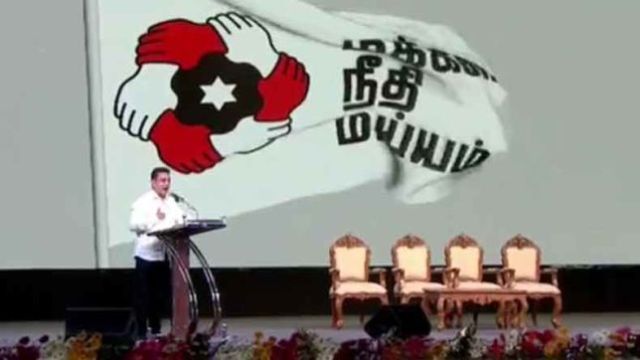
by Editor | May 25, 2021 | News, Politics
 Chennai : Actor-turned-politician Kamal Haasan’s party Makkal Needhi Maiam (MNM) does not believe in implementation of total prohibition as it would bring in more harm.
Chennai : Actor-turned-politician Kamal Haasan’s party Makkal Needhi Maiam (MNM) does not believe in implementation of total prohibition as it would bring in more harm.
He said the party also does not believe in freebies.
“The question is whether the liquor shops should be spread out like this. We have to go in search of a post office but there is no need to search for a TASMAC (Tamil Nadu government liquor outlet). We have to change this situation,” Kamal said.
Kamal said this at a time when major opposition political parties in Tamil Nadu were demanding implementation of total ban on sale of liquor in the state.
In his final column in the Tamil magazine Ananda Vikatan, Kamal on Thursday said it is not possible to make an entire society to dislike liquor.
Kamal said total prohibition would result in creation of a mafia which has been seen in the history of the world.
He said liquor drinking is not like gambling that could be stopped suddenly.
Kamal said human body would not agree to stop consumption of liquor suddenly. He said liquor consumption could be reduced but whether it could be stopped totally is doubtful.
Terming the introduction of prohibition and then lifting it as a game, that he does not understand, he added.
According to him, to attract women votes political parties play liquor prohibition card. Kamal said opening of liquor shops near schools is a game that is worrying him.
On freebies by government, Kamal said it will not work out whereas a permanent way has to be chalked out for the people’s livelihood.
On his party’s policy on education Kamal said the focus will be on providing good quality education to many than being satisfied with just educating more number of people.
He said the party has several plans to upgrade the quality of education provided in government schools.
Kamal also said his MNM party opposes the common entrance exam for medical college admission and also having education in the concurrent list in the Indian Constitution.
He said policies are different and implementing plans to achieve the policy are different.
Kamal said change of plan does not mean change in the party’s policy.
He said people’s welfare and Tamil Nadu’s prosperity are the broad policies of the MNM party and there will be several plans to achieve the same.
According to him, there are two groups — one in Harvard University and the other based locally — who would guide the party in terms of various plans.
—IANS
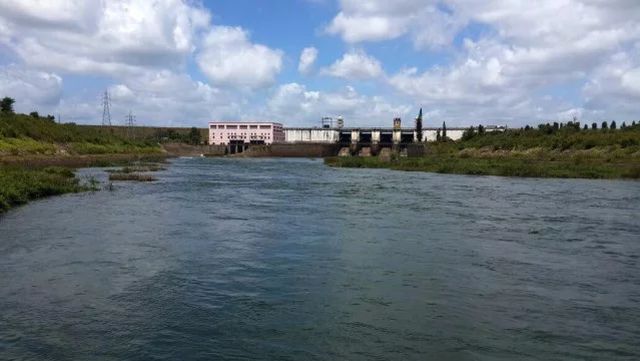
by Editor | May 25, 2021 | News, Politics

Cauvery river
New Delhi : In a setback to Tamil Nadu, Supreme Court on Friday reduced its share of Cauvery river water to 177.25 thousand million cubic feet (tmcft) down from 192 tmcft allocated by a Tribunal in 2007.
A bench of Chief Justice Dipak Misra, Justice Amitava Roy and Justice A.M. Khanwilkar reduced the share of the state as it noted that the Cauvery Tribunal had not taken into account the ground water available in Tamil Nadu’s side of the river basin.
Consequently, the share of Karnataka has been increased by 14.75 tmcft, which includes increased allocation for “global” city of Bengaluru for drinking purposes.
Allocating 4.75 tmcft to Bengaluru, Chief Justice Misra pronouncing the judgement said that Karnataka can use the increased allocation for irrigation and industrial purposes by marginally increasing its area under crop.
While bringing down the allocation for Tamil Nadu, the top court kept intact the allocation made to Kerala and Puducherry by the Tribunal.
The court directed that as per the Tribunal award, the Centre would take steps for setting up the Cauvery Water Management Board for the implementation of the interim water sharing arrangement, which it (court) said would remain in operation for the next 15 years.
—IANS





